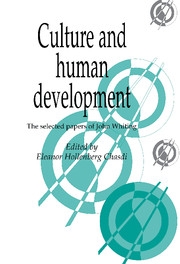Book contents
- Frontmatter
- Contents
- List of figures
- Preface
- Acknowledgments
- Introduction: John Whiting and anthropology
- Fifty years as a behavioral scientist: autobiographical notes
- Part I Theory and methods
- Part II Environment and history
- Part III Moral development
- Part IV Gender development
- Introduction
- 8 The absent father and cross-sex identity
- 9 Effects of climate on certain cultural practices
- 10 Male sex-role resolutions
- Part V Development of social behavior
- Bibliography
- Complete bibliography of John W. M. Whiting's work
- Index
Introduction
Published online by Cambridge University Press: 23 December 2009
- Frontmatter
- Contents
- List of figures
- Preface
- Acknowledgments
- Introduction: John Whiting and anthropology
- Fifty years as a behavioral scientist: autobiographical notes
- Part I Theory and methods
- Part II Environment and history
- Part III Moral development
- Part IV Gender development
- Introduction
- 8 The absent father and cross-sex identity
- 9 Effects of climate on certain cultural practices
- 10 Male sex-role resolutions
- Part V Development of social behavior
- Bibliography
- Complete bibliography of John W. M. Whiting's work
- Index
Summary
This part, dealing with gender development and conflicts in sex-role identification, contains three articles which were selected to represent Whiting's long-term interest and classic contributions in this area, frequently cited in the research literature, and spanning a period of three decades. The first article elaborates the status-envy theory of identification and tests hypotheses derived from it, including the relationship of cross-sex identity to male initiation rites. The remaining articles expand upon this relationship and explore various factors associated with the resolutions of conflict in sex-role identity.
In the first article, “The absent father and cross-sex identity,” the status-envy theory of identification is expanded and hypotheses derived from it are tested cross-culturally as well as examined in the context of studies of children and their families in Norway and the United States.
Three kinds of identity are distinguished: (1) attributed identity: statuses assigned to a person by other members of his society; (2) subjective identity: statuses a person sees himself as occupying; and (3) optative identity: statuses a person wishes he could occupy. The authors state that “the aim of socialization in any society is to produce an adult whose attributed, subjective, and optative identities are isomorphic: ‘I see myself as others see me, and I am what I want to be'” (p. 212).
In the process of socialization, there are often conflicts between primary identifications established in infancy and secondary identifications developed in later childhood. The article explores conflicts in gender identification for males. It specifies the variables that lead to cross-sex identity conflicts – early identification with females and later identification with males – and some of the behaviors that result from such conflicts.
- Type
- Chapter
- Information
- Culture and Human DevelopmentThe Selected Papers of John Whiting, pp. 207 - 209Publisher: Cambridge University PressPrint publication year: 1993

